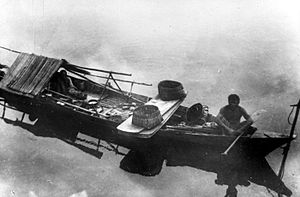Domoni
 A Domoni family on their boat, 1920 | |
| Total population | |
| ~15,000,000 | |
| Regions with significant populations | |
| 10,000,000 | |
| Other | 5,000,000 |
| Languages | |
| Ziba | |
| Religion | |
| Primarily Badi and irreligion | |
The Domoni (Ziba: ![]() [dɒmɒni] lit. 'boat people') or Jaujeni (Ziba:
[dɒmɒni] lit. 'boat people') or Jaujeni (Ziba: ![]() [ð̠ɒɯð̠əni] lit. 'river people') are an ethnic group or social class, primarily in Dezevau and the Dezevauni diaspora. They traditionally live on and make their living on water, inhabiting boathouses or similar dwellings, and engaging in activities such as fishing, navigation and aquaculture, as well as waterborne nomadism.
[ð̠ɒɯð̠əni] lit. 'river people') are an ethnic group or social class, primarily in Dezevau and the Dezevauni diaspora. They traditionally live on and make their living on water, inhabiting boathouses or similar dwellings, and engaging in activities such as fishing, navigation and aquaculture, as well as waterborne nomadism.
The Domoni have been an identifiable group since at least the 15th century, and have historically been subject to discrimination, marginalisation, and assimilationist policies, despite their importance as sailors in the riverine infrastructure of the Aguda Empire, and in the navies of later states in and around Dezevau. Folk conceptions of culture in Dezevau conceived of the Domoni as the smallest of three main groupings, the other two being peasants and urbanites. In modern times, economic changes have resulted in the decline of the traditional lifestyle of the Domoni, with many of them migrating away from ancestral waters or settling on land.
Like most people in Dezevau, Domoni generally speak varieties of Ziba, and traditionally practiced Badi. High levels of contact, migration and intermarriage between Domoni and neighbouring groups mean that categorisation is difficult, but it is estimated that there are about 15 million Domoni, mostly in Dezevau, forming about 5% to 10% of the Dezevauni population (a proportion that has been maintained roughly for the last century).
Name
The usual Domoni endonym is ![]() (jaujeni), meaning "river people" in Ziba. However, the usual exonym applied is
(jaujeni), meaning "river people" in Ziba. However, the usual exonym applied is ![]() (domoni), meaning "boat people". The terminology can be said to reflect the conceptions of identity; while the Domoni regard themselves as people whose home is the waterways, (in contrast with the juni, urbanites, and the geguoni, peasants) they have been regarded by outsiders as merely inhabitants of vessels on them. In the past, the terms were more charged, but Domoni is now the most common term generally, except as used by Domoni between themselves.
(domoni), meaning "boat people". The terminology can be said to reflect the conceptions of identity; while the Domoni regard themselves as people whose home is the waterways, (in contrast with the juni, urbanites, and the geguoni, peasants) they have been regarded by outsiders as merely inhabitants of vessels on them. In the past, the terms were more charged, but Domoni is now the most common term generally, except as used by Domoni between themselves.
These terms might also be used in a more general, common sense, to refer to people associated with, living on or working with boats or rivers.
In Euclean languages, the Domoni were sometimes referred to as "Sea Gypsies", drawing parallels between them and Savaders because of their marginalisation, nomadism, and dispersion. This term, like the term "gypsy" itself, is antiquated, and now considered offensive.
History
Ancient
The precise origins of the Domoni are unclear, but it is generally thought that they are descendant from the same populations which have inhabited Dezevau and the surrounds for the last two millennia, dating back to the nascent urbanisation of the Dhebinhejo Culture. Economic activities and transport on and around the rivers of Dezevau were very important to societies in the region since time immemorial, but a distinct waterborne population probably did not develop until development spurred the intensification of navigation, the construction of canals and other hydraulic projects, and in general, an intensification of waterborne activities.
Medieval
In the city-states of medieval Dezevau, the Domoni occupied a middle ground in the dichotomy between urbanites and peasants. While they lived their lives outside the symbolic limina of the city walls (most city-states' ports and docking facilities were outside their walls, so that Domoni visiting or near city-states often did not enter them proper for long), they were also not landed. Because of their frequent migration and involvement with commerce and hydraulic infrastructure (Domoni were often employed as temporary labourers on canals and such), peasants viewed them as more urban than rural. On the other hand, as mentioned, they did not live or work within the boundaries of cities, were dispersed in population, and worked in physical, resource-gathering occupations; the inhabitants of the cities regarded them as essentially rural.
Political power was concentrated in the cities in the city-state systems of medieval Dezevau. Like rural peasants, Domoni were typically affiliated with, but not full citizens of city-states; they provided tribute, taxes or services in return for access to facilities (such as for trade or repair) and goods, but the switching of allegiances was relatively lightly done. However, unlike farmers, Domoni had no immovably permanent fixed abode, and also functioned in smaller units than the rural villages; the result was that the relationships between Domoni and city-states tended to be more commercial, more specific, and more often at arm's length. It has been argued that proto-capitalism developed not only in the Dezevauni city-states, but also as a result of their engagement with the Domoni, necessitating complexity as there were large distances, various jurisdictions and various parties (who might not be as tightly bound by social mores) involved.
Where they suffered discriminatory policies or misunderstanding,
The Domoni themselves began to regard themselves as a distinctive group in the medieval era.
